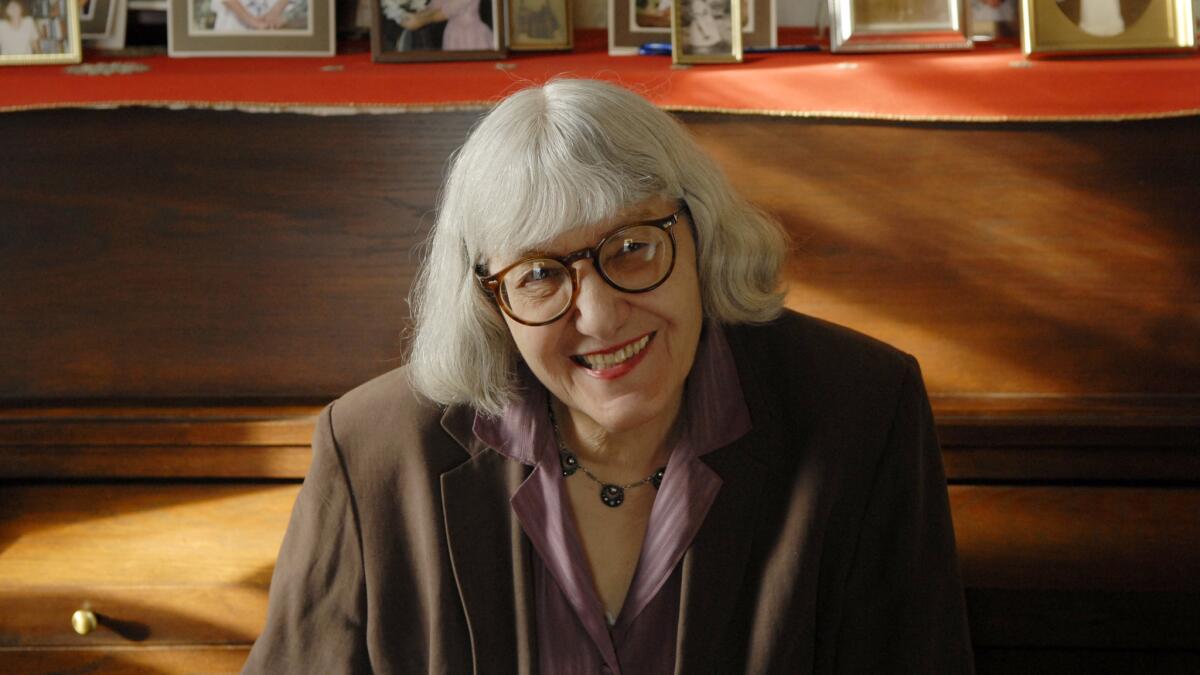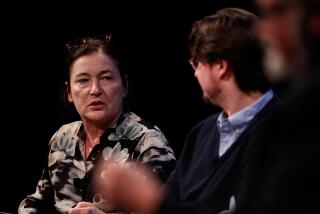Q&A: Cynthia Ozick, with her new collection ‘Critics, Monsters, Fanatics,’ on her writing life

The novel is the crown jewel of culture for Cynthia Ozick, who has written novels, short stories and criticism, winning major plaudits in all forms. Now 88, she takes the temperature of our time and diagnoses its condition with the timeless insight of a sage. Ozick is a critic par excellence, and our cultural moment is lucky to have her and her new collection, “Critics, Monsters, Fanatics & Other Literary Essays” (Houghton Mifflin Harcourt: 224 pp., $25). We spoke to her by phone; this interview has been edited for length and clarity. A longer version appears online.
It becomes apparent when reading your essays that the novel is your preferred form. What is it about fiction that intoxicates you in ways that nonfiction can’t?
I should say that I’ve been scolded by Edward Hoagland, a wonderful essayist, for this point of view. He also writes novels, but he reveres the essay and says it can move us as much as the novel. I suppose that’s true of what we call the personal essay, but by and large the difference is that novels carry us away. I’m afraid I can only answer this in clichéd terms. Novels carry us away in two ways. The tritest way is that we get to inhabit other lands, other customs, other personalities. The other way can be mistaken for what we usually call poetry — although a novel that is closer to poetry than prose would be deadly, I think. But it has to do with language, and that means cadence, pacing and the magic of dialogue. Dialogue is so extraordinary because it has to sound like real life, but it never is real life; it’s immensely artful. So it’s those two things together — being carried into places we can’t go ourselves and being carried by the narrative technique. (Although “technique” is such a mechanical word, it’s much more magical than that. It has to do with, as Henry James put it, “the scene,” and how these scenes are integrated or separated.) In other words, it’s the method of the language and the madness of being carried away where you’ve never been.
How do you start an essay? Do you have a thesis already in your head? Do you write from that argument or toward that argument?
The thing about essays as opposed to fiction is that you have something in your hand to begin with, which is the subject. If you’re going to write on, let’s say, Willa Cather, you at least know that much. Or if you’re going to write on coffee tables — well then, you know your subject is coffee tables. You’re so far ahead as opposed to when you’re writing fiction, which can start from many points, but essentially you discover what a story is about as you move into it. In the same way, this can happen with the essay — you can discover what you think as you move into it — but most crucially you start with something concrete, you have a subject.
We have such intense access to the immediate. What gets obliterated, then, is history. To live without history is tragic.
— Cynthia Ozick
You write that “superior criticism — the novel’s ghostly twin — not only unifies and interprets a literary culture but has the power to imagine it into being.” How does criticism imagine a literary culture into being?
Criticism gives us the mood and the crisis in which novels are grown. It doesn’t look at each novel as a thing in itself. I think the expression I used in the book is a wolf-child brought up in the wilderness without any culture around it. Criticism connects novels to one another and to the culture. When you read a novel, although you’re reading a story for its own sake, whether you’re aware of it or not, you’re also being marinated in an atmosphere of ideas and the noise of the culture around you. That’s true even if the novel has nothing at all to do with your society.
You talk about critics as needing “an authoritative posture, or standard, or even prejudice.” How would you describe your own posture as a critic?
It’s odd because I’ve been looking at a few of the reviews for this book, and I see words like “lashing out” and “vulture” and “aggressive snootiness” and other things of that kind. From the outside, I think the word would be “judgmental.” From the inside, it’s the same word, but it has a different tone entirely, for judgment is what criticism is. You’re looking at a work within a society and you make a judgment.
Your essays seem to mourn the fact that literature doesn’t have the prominence it used to. What would you say to that assessment?
I see my essays as — or at least they should be — exciting and exuberant. I admit that there is an accusation that holds up, but not entirely. Everybody thinks that the time of their midpoint of life was a golden age, which is by and large delusional. Old folks remembering how it was better in the old days — “look at these kids today” and all that. But in certain times, at certain cultural junctures, there’s a strong additional element. I would say the Gutenberg period changed the culture enormously, the Reformation too, and I think we’re in a moment like that now because of new technology. That new technology brings with it a sense of: “the only thing that matters is the here and now,” “live in the moment,” “take your app and be hedonistic with it,” “live for the immediate.” We have such intense access to the immediate. What gets obliterated, then, is history. To live without history is tragic. So if I mourn anything at all, or if we ought to mourn anything at all, it is the sense of history because the here and now is incomprehensible without it.
For you, are the twin capital Ls of Life and Literature enemies in a way? You’ve said, Life is the “anti-muse.” Life interrupts. How do you see the interplay between Life and Literature, especially in relation to Henry James’ idea of “the madness of art”?
In “The Middle Years,” the Henry James story on that topic, he answered it for all time. The social personality is really irrelevant to what makes the writer. When you’re in isolation, in quiet, often in the middle of the night, away from the exigencies of life, which you can never escape from for very long, that is when your mind is freest and most on fire. Though I think the social personality is not always fraudulent, James called it “the graciousness of mere twaddle.” If you think about how life is lived for everybody, not just writers, day by day, most of it is lubricated by the graciousness of mere twaddle.
In “The Lastingness of Saul Bellow,” you quote from one of Bellow’s letters, in which he wrote, “it all boils down to a pair of patent-leather sandals.” Your discussion of that passage is brilliant, you extrapolate much from it about “the culmination of a theory of pastness” and also how it describes succinctly Bellow’s “lastingness.” So if for Bellow, “it all boils down to a pair of patent-leather sandals,” what does it all boil down to for Cynthia Ozick?
Oh, I could say … a little green leather coat? But that would be an imitation of Bellow’s technique, his insight, his feeling. I think it all boils down for each person to some specific feeling. It could be a hurt; it could be a loss. Hmm … what does it all boil down to for me? A certain afternoon in a very quiet part of the Bronx, which was semi-rural, somewhere in childhood in the 1930s, when you could still see horse turds in the road, and the road was tar. The milkman still came with his horse. Those droppings in the heat of summer, you could smell them. But the smell was not unpleasant because you could smell the barn, you could smell the straw. You could even see the straw in the melting tar. It would be utterly quiet, nobody in the streets, no other kid. You would stand there and just feel the heat of summer and something mysterious about life which you could not possibly describe.
Malone is a writer and professor of English. He is the founder and editor-in-chief of the Scofield and a contributing editor for Literary Hub.
More to Read
Sign up for our Book Club newsletter
Get the latest news, events and more from the Los Angeles Times Book Club, and help us get L.A. reading and talking.
You may occasionally receive promotional content from the Los Angeles Times.






